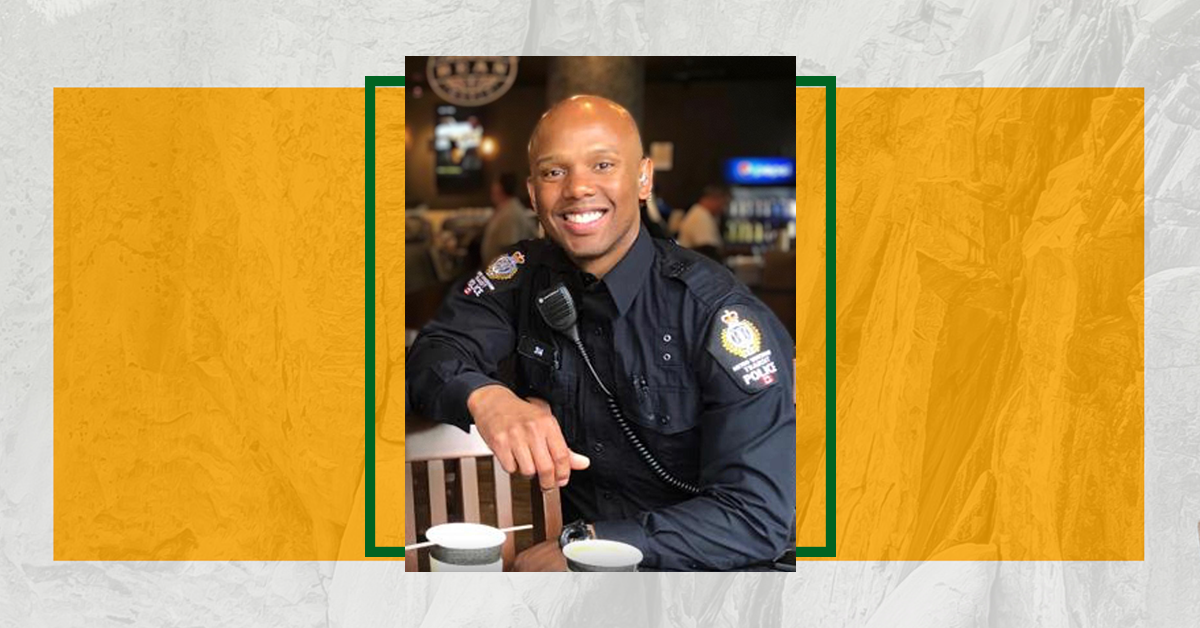From lavender oil to walking the beat: The importance of humanizing policing
From lavender oil to walking the beat: The importance of humanizing policing

A career in policing was never on the radar for Travis Blair, despite his love for helping people and a long lineage of maternal healthcare workers.
Travis was born and raised in Winnipeg, his family emigrating from England just before he was born. His parents, born in Jamaica, moved to England as many other Caribbean people did during the ‘60s. A better life and more job opportunities were promised within the service industry and the expanding railroad.
Growing up as a young kid in predominantly white Winnipeg, Travis was no stranger to racism. At the time, Travis’ small community consisted mostly of Eastern European ex-pats, Indigenous families, and a very small number of other minorities.
A job opportunity for his father at CN had the Blairs moving across the country to Surrey, B.C., in 1990. Travis was great at making friends with anyone around him. He noted that many of his friends were Asian due to an influx in emigration from Hong Kong in the late ‘80s.
After graduation, Travis worked numerous odd jobs while trying to figure out what he wanted to do with his life. In 2001, a friend sold him on the idea of going to massage therapy school to become a Registered Massage Therapist. And so, he attended the West Coast College of Massage Therapy in New Westminster. After working for 11 successful years as an RMT, Travis was ready for his next adventure.
“Always change!” Travis laughs about his life. As he got older, he found himself wanting more – more stability, benefits, pension – all that good stuff!
He had always had great respect for law enforcement and authority but had never explored it as a possible job opportunity. A natural conversationalist, Travis found himself chatting with officers as he encountered them through the years. Despite thinking it would be an interesting job, Travis never made any efforts to pursue it until a volunteer opportunity arose at the Vancouver Community Policing Centre in Vancouver’s Chinatown.
His time volunteering brought many interesting training experiences – tactical cycling, speed traps, and seminars on gang intelligence were just a few. “It was really cool and just felt right. It sparked something within me that became a catalyst to apply for a career in policing,” he says.
Two years into his volunteering journey, he decided it was time to trade in the “lavender oil for pepper spray,” he laughs.
His first application into policing was with Metro Vancouver Transit Police in 2012. He didn’t land the job but didn’t let that discourage him. Travis continued volunteering and lived for his policing studies that soon landed him a job with the RCMP in 2013. In 2015 he graduated from Depot, the RCMP training academy, and completed a brief stint in Ottawa, rotating through duties on Parliament Hill, before being posted to Burnaby. He applied and was accepted into the Transit Police shortly thereafter.
Being a Black police officer during the Black Lives Matter movement was a challenge. Travis notes that he faced more rampant racism and the use of racial slurs during those months than ever before.
“People are police and police are people. At the end of the day, we’re all just people.”
When asked about being a Black police officer, Travis impresses the importance of humanizing policing, especially when dealing with BIPOC (Black, Indigenous, and People of Colour). He strives to ensure that the public has a positive experience with the police as he feels it does wonders for bolstering public perception.
“Being raised by parents who immigrated to this country has helped me better connect with people on a personal level; it can be the difference between acknowledging a person’s situation or understanding a person in a time of need. The general public wants to see a cross-section of society or their community represented in the local police force. That alone is reassuring to support a positive perception of police in the public eye.”
The importance of honouring Black History Month for Travis is that “Black History Month became a catalyst for change as many white people had worked alongside the Black people for their freedom and civil rights in the U.S.A. Black history has helped bring awareness to multiculturalism being synonymous with being Canadian or American.”
Want to be a better ally? Travis says to read, “Read anything by Maya Angelou!”
If he could go back in time, Travis would tell his younger self that “welcoming challenges builds confidence and leads to success”, though it seems like little Travis knew that all along.






Thanks for sharing
“Seeing is believing”
Great story brother, love the person you are. Humble, kind, and respectful.
Wonderful story Travis. Thank you for sharing! You are an inspiration. CJ
I am so happy for you!